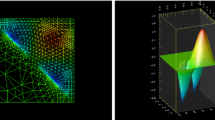Abstract
In the paper, we derive a posteriori error estimates of a discontinuous Galerkin (DG) finite element method for optimal control problems governed by the transport equation. We use discontinuous piecewise linear finite elements to approximate the state and co-state variables, and use the variational discretization approach to discretize the control variable. We first get a posteriori error estimates in \(L^2\) norm for the state, co-state and control variables. Moreover, we also provide a very simple derivative recovery formula of the state and co-state which is a superconvergence approximation to the directional derivative. These results are used to construct asymptotically exact a posteriori error estimates for the directional derivative approximation. Finally, some numerical experiments are presented to illustrate the theoretical results.









Similar content being viewed by others
Data Availability
The data are available on request.
References
Adams R (1975) Sobolev spaces. Academic Press, New York
Baccouch M (2015) Superconvergence and a posteriori error estimates of the DG method for scalar hyperbolic problems on Cartesian grids. Appl Math Comput 265:144–162
Becker R, Kapp H, Rannacher R (2000) Adaptive finite element methods for optimal control of partial differential equations: basic concept. SIAM J Contr Optim 39:113–132
Becker R, Rannacher R (2001) An optimal control approach to a posteriori error estimation in finite element methods. Acta Numerica 10:1–102
Chen Y, Lu Z (2015) High efficient and accuracy numerical methods for optimal control problems. Science Press, Beijing
Cockburn B, Dong B, Guzmán J (2008) Optimal convergence of the original DG method for the transport-reaction equation on special meshes. SIAM J Numer Anal 46:1250–1265
Dörfler W, Nochetto R (2002) Small data oscillation implies the saturation assumption. Numer Math 91:1–12
Gong W, Yan N (2017) Adaptive finite element method for elliptic optimal control problems: convergence and optimality. Numer Math 135:1121–1170
Hinze M (2005) A variational discretization concept in control constrained optimization: the linear-quadratic case. Comput Optim Appl 30:45–63
Hoffmann W, Schatz A, Wahlbin L, Wittum G (2001) Asymptotically exact a posteriori estimators for the pointwise gradient error on each element in irregular meshes part 1: a smooth problem and globally quasi-uniform meshes. Math Comput 70:897–909
Johnson C, Pitkäranta J (1986) An analysis of the discontinuous Galerkin method for a scalar hyperbolic equation. Math Comput 46:1–26
Li R, Liu W, Ma H, Tang T (2002) Adaptive finite element approximation for distributed elliptic optimal control problems. SIAM J Contr Optim 41:1321–1349
Li R, Liu W, Yan N (2007) A posteriori estimates of recovery type estimate for distributed convex optimal control problems problems. J Sci Comput 33:155–182
Lions JL (1971) Optimal control of systems governed by partial differential equations. Springer, Berlin
Liu H, Wang S, Han H, Yuan L (2017) Error analysis of discontinuous Galerkin methods for optimal control problem governed by the transport equation. Numer Methods Partial Diff Equ 33:1493–1512
Liu W, Yan N (2000) A posteriori error estimates for a model boundary optimal control problem. J Comput Appl Math 120:159–173
Liu W, Yan N (2001) A posteriori error estimates for distributed convex optimal control problems. Adv Comput Math 15:285–309
Liu W, Yan N (2001) A posteriori error estimates for convex boundary control problems. SIAM J Numer Anal 39:73–99
Liu W, Yan N (2002) A posteriori error estimates for control problems governed by Stokes equations. SIAM J Numer Anal 40:1850–1869
Liu W, Yan N (2008) Adaptive finite Element methods for optimal control governed by PDEs. Science Press, Beijing
Naga A, Zhang Z, Zhou A (2006) Enhancing eigenvalue approximation by gradient recovery. SIAM J Sci Comput 28:1289–1300
Reed WH, Hill TR (1973) Triangular mesh methods for the neutron transport equation. Tech Report LA-Ur-73-479, Los Alamos Scientific Laboratory
Xiong C, Li Y (2009) A posteriori error estimators for optimal distributed control governed by the first-order linear hyperbolic equation: DG method. Numer Methods Partial Diff Equ 27:491–506
Xiong C, Luo F, Ma X, Li Y (2016) A priori error analysis for optimal distributed control problem governed by the first order linear hyperbolic equation: hp-streamline diffusion discontinuous galerkin method. J Numer Math 24:125–134
Zhang T, Feng N (2011) A posteriori error analysis of the discontinuous finite element methods for first order hyperbolic problems. Appl Math Comput 21:1752–1764
Zhang T, Zhang S (2015) Optimal convergence and a posteriori error analysis of the original DG method for advection-reaction equations. Appl Math 60:1–20
Acknowledgements
This work is supported by the National Natural Science Foundation of China (no. 12271056).
Author information
Authors and Affiliations
Corresponding author
Ethics declarations
Conflict of interest
The authors declare no competing interests.
Additional information
Communicated by Wei Gong.
Publisher's Note
Springer Nature remains neutral with regard to jurisdictional claims in published maps and institutional affiliations.
Rights and permissions
Springer Nature or its licensor (e.g. a society or other partner) holds exclusive rights to this article under a publishing agreement with the author(s) or other rightsholder(s); author self-archiving of the accepted manuscript version of this article is solely governed by the terms of such publishing agreement and applicable law.
About this article
Cite this article
Liu, H. A posteriori error estimates of a DG method for optimal control problems governed by the transport equation. Comp. Appl. Math. 42, 355 (2023). https://doi.org/10.1007/s40314-023-02492-7
Received:
Revised:
Accepted:
Published:
DOI: https://doi.org/10.1007/s40314-023-02492-7



